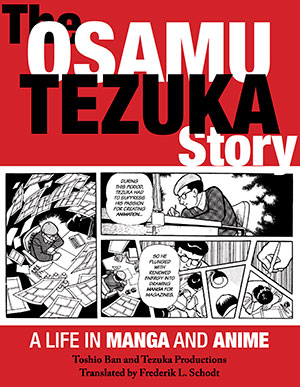What Was Osama Tezuka First Ideas For Anime
 Berkeley, California. Stone Bridge Press. 2016. 914 pages.
Berkeley, California. Stone Bridge Press. 2016. 914 pages.
This is a large book. Massive. Shockingly and so. In fact, when you start selection information technology upwardly at that place is trivial you can do other than marvel at the size and wonder how the binding holds it together. But and then you dig into the story and you realize what a giant Osamu Tezuka really was and how fifty-fifty a volume at a hundred times this size could barely brainstorm to capture this explosive genius.
When talking about Tezuka, you are obligated to mention his title as Nihon's "God of Manga." Before reading this, I never gave much thought to what this meant. It was a nickname, like Jack "King" Kirby for American comics. And, to be perfectly honest, I was never a Tezuka fan. Sure, I knew he was vivid, but aside from Astro Male child and Black Jack, I hadn't read much of his work. His style didn't appeal to me, and I have always been a Shigeru Mizuki guy. But wow, The Osamu Tezuka Story opened my optics. Tezuka didn't just make manga, he created manga genres. He invented the idea of "story manga," of moving across gag strips into long-format stories, aka "The way all manga is done today." Tezuka could have lived for a thousand years and never run out of ideas. Reading this, Tezuka seems less like a human being and more than like creativity incarnate—a true "God of Manga."
Cartoonist Toshio Ban pulls off this manga biography beautifully. One of Tezuka's chief administration for years, he tin can imitate his dominate's style when he needs to simply brings his own flair to the work. Ban keeps the energy high, moving us through Tezuka'due south life at a pace equally fast equally Tezuka himself. The story was originally serialized, which ways that there are several check-in points and some repetition. I found this incredibly helpful, actually. This wasn't a comic I could read in 1 sitting, so I appreciated the landmarks along the way.
Fred Schodt's translation was wonderful: fluent, smooth, and with natural linguistic communication. I tin't imagine anyone else translating this—Schodt himself even appears in a panel in this book (run across WLT, March 2016, 7).
I slight criticism: The Osamu Tezuka Story is absolutely a work in praise of Tezuka. This is no "warts and all" biography; there is nothing here that isn't presented every bit wonderful. Tezuka was a workaholic to the extreme, and while this meant many fantastic creations, you lot can see the strain on those around him, caught up in the cyclone of a man who never slept, never rested, and never stopped even to breathe. They are the collateral damage of a strength of nature, like Semele burned to ashes by seeing Zeus in his full glory. Still—the world of comics we currently live in is worth it. The Osamu Tezuka Story: A Life in Manga and Anime has made me a new disciple to the God of Manga. Now I have a lot of reading to do.
Zack Davisson
Seattle, Washington
Get the book on Amazon or add it to your Goodreads reading list.
Source: https://www.worldliteraturetoday.org/2017/march/osamu-tezuka-story-life-manga-and-anime-toshio-ban-tezuka-productions
Posted by: labordebuirl1989.blogspot.com

0 Response to "What Was Osama Tezuka First Ideas For Anime"
Post a Comment